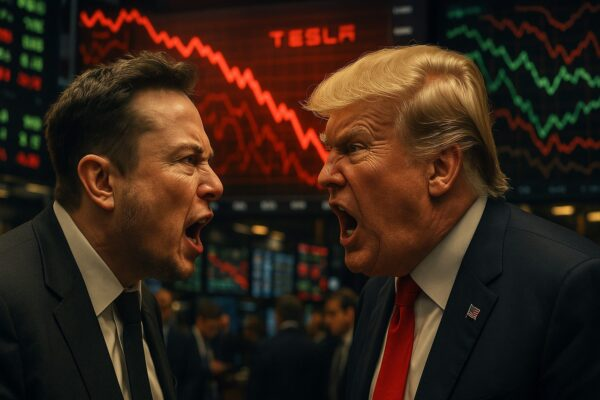In 2025, Tesla finds itself at the center of a political firestorm. A public feud between CEO Elon Musk and former President Donald Trump has created shockwaves—not just in Washington but also on Wall Street. What began as a disagreement over policy quickly escalated into a headline-grabbing conflict that impacted Tesla’s stock price, investor confidence, and the company’s long-term prospects.
In an era where political comments can move markets, the Musk-Trump feud is a prime example of how personal and public tensions can collide with business realities. Tesla’s stock took a steep hit in just 24 hours, erasing billions in value and setting off alarms among retail and institutional investors alike.
This article breaks down the timeline of events, the impact on Tesla shares, and what investors should watch moving forward. It’s a reminder that in 2025, navigating the stock market requires both financial insight and political awareness.
What Triggered the Feud Between Trump and Musk?
The tension began when Elon Musk made public statements criticizing Donald Trump’s proposed rollback of key clean energy incentives. Trump, who’s mounting a 2024 comeback campaign with business-focused messaging, responded aggressively—hinting that, if re-elected, he might pull federal support for electric vehicles (EVs). This was a direct hit to Tesla, which benefits significantly from EV tax credits and government-funded sustainability programs.
While neither party mentioned specifics initially, Trump’s comments were perceived as targeting Tesla’s growth model. As the feud gained traction on social media and cable news, investors quickly realized the situation wasn’t just political—it had real implications for the company’s bottom line.
Tesla Stock Tumbles: The Immediate Market Impact
The fallout was swift and brutal. Tesla shares plunged over 14% in a single trading day—one of the company’s worst stock performances in recent memory. Analysts cited political risk as the leading driver of the sell-off. Traders feared that a rollback of federal support under a potential Trump presidency could cripple Tesla’s growth trajectory.
According to reports, short-sellers—investors who bet on stock declines—made nearly $4 billion during the drop. This shows how seriously the market took the Musk-Trump conflict. For many, it was a wake-up call that Tesla’s reliance on political goodwill might be a vulnerability.
This event is a powerful reminder that even a company as innovative as Tesla isn’t immune to policy risk, particularly when its business model depends on environmental subsidies, federal contracts, and regulatory approvals.
Investor Concerns About Tesla’s Future
The feud has introduced a new layer of uncertainty for Tesla investors. While the company has strong fundamentals and ambitious growth plans, the risk of losing government support looms large. Federal EV tax credits and clean energy grants have played a major role in Tesla’s ability to offer competitive pricing.
If Trump were to win re-election and make good on his threat to eliminate these programs, Tesla would likely have to adjust its pricing strategy or absorb the cost. This could reduce margins and lower demand, particularly among price-sensitive buyers.
Additionally, investors are worried about long-term growth. The uncertainty makes it difficult for analysts to model future cash flows, which impacts Tesla’s valuation. Until there’s clarity, many institutions are taking a cautious approach.
The Robotaxi Roadblock: Innovation in Jeopardy
One of the most ambitious projects on Tesla’s roadmap is its robotaxi service—autonomous vehicles designed for ridesharing. Musk had hinted at a soft launch in Austin, Texas, this year. However, the feud could slow down regulatory approvals critical to launching the service.
Self-driving technology requires extensive coordination with federal and local regulators. If Tesla finds itself out of political favor, it may face delays in licensing, safety approvals, or even zoning issues. The robotaxi delay would be a significant blow to Tesla’s innovation pipeline.
Moreover, the perception of political instability could hurt Tesla’s partnerships with cities or agencies currently exploring EV-friendly initiatives. For investors, stalled innovation translates to missed revenue targets—and another reason for stock price volatility.
Can Tesla Recover From This Crisis?
Tesla shares did experience a modest rebound the day after the drop, driven by speculation that Musk and Trump might reconcile. Though the White House has not confirmed any peace talks, the rumor alone was enough to lift investor sentiment temporarily.
This suggests that the market still has confidence in Tesla’s fundamentals. However, the recovery is fragile. Any new public clash could reignite the panic and push shares down again. Investors are hoping for clear, neutral communication from Tesla leadership.
In the past, Musk has demonstrated an ability to steer Tesla through public controversies. If the company can reaffirm its growth strategy, clarify its relationship with regulators, and avoid further political entanglement, the stock could bounce back strongly.
Political Risk and Market Volatility: A New Normal
In today’s market, political influence is no longer a background issue—it’s front and center. Tesla’s situation shows how much government policy can shape stock performance, particularly in regulated industries like clean energy, tech, and healthcare.
Investors must now consider political alignment and regulatory risk alongside traditional financial metrics. For companies like Tesla, this means managing relationships with both major parties, keeping public statements balanced, and preparing contingency plans for hostile regulatory environments.
Stock prices now reflect not just earnings potential, but also media narratives and public perception. That makes clear communication and strategic diplomacy essential for publicly traded companies.
How Tesla Can Manage Political Fallout
There are several detailed steps Tesla can take to lower its exposure to political risk and restore investor confidence:
Build bipartisan relationships
Tesla should emphasize its role in national clean energy and manufacturing, not just in traditionally Democratic states. By actively engaging lawmakers on both sides of the aisle and aligning its messaging with common economic goals—like energy independence and job growth—Tesla can reduce its vulnerability during political transitions.
Highlight job creation
Tesla has created tens of thousands of high-paying jobs across the U.S., especially in places like Texas and Nevada. The company should spotlight these achievements in public communications and earnings calls. Demonstrating its contribution to the U.S. labor market may help build goodwill with voters and politicians alike.
Increase transparency
Frequent and clear updates to shareholders can calm market nerves during controversies. If Tesla shares timely updates about its political strategy, innovation pipeline, and risk management, it can reduce speculation and misinformation. Transparent leadership shows control, which attracts institutional investors.
Diversify markets
Tesla should accelerate its international expansion to balance out risk from U.S.-centric policies. Expanding manufacturing and sales in Europe, China, and India can help buffer the company against sudden shifts in U.S. political sentiment.
Engage in policy lobbying
Tesla should participate in industry coalitions and policy advocacy efforts that promote EV adoption across party lines. Working with non-partisan organizations focused on clean energy policy can help protect its interests in Washington, regardless of election outcomes.
Avoid public feuds
Elon Musk’s social media presence is highly influential but can also be risky. Tesla may benefit from a more measured and strategic communication style to prevent unnecessary conflicts. A professional tone during political moments may foster better relationships and avoid further damage.
Reinforce innovation
Focusing on groundbreaking technologies like the Cybertruck, energy storage systems, and autonomous driving can keep Tesla in the spotlight for the right reasons. Continued innovation positions Tesla as indispensable in the future of mobility, making it harder for any administration to overlook or target the company.
By taking these strategic actions, Tesla can not only weather the current political storm but also position itself as a resilient and future-proof industry leader.
What Investors Should Watch Next
In the aftermath of the Trump-Musk feud, investors should pay close attention to key developments that could further influence Tesla’s stock and market stability:
Campaign trail remarks from Donald Trump
As the election cycle heats up, Trump’s statements on electric vehicles and environmental policies will be crucial. If his rhetoric intensifies against EV makers, expect more volatility for Tesla and related stocks.
Federal guidance on clean energy incentives
Watch for updates on the Inflation Reduction Act, EV tax credits, and Department of Energy funding. These initiatives directly impact Tesla’s pricing and margins. Any rollback or delay in these incentives could cause concern among investors.
Tesla’s earnings calls and public statements
The tone and substance of upcoming earnings calls will offer critical insight. Investors should look for how Tesla addresses political risks, guidance revisions, and progress on new initiatives like the robotaxi program.
Progress on the robotaxi project
This autonomous vehicle initiative is a major piece of Tesla’s growth strategy. Any signs of regulatory slowdown or timeline changes—especially if tied to political fallout—could affect the company’s valuation and strategic direction.
Elon Musk’s social media activity
Investors should monitor Musk’s public statements closely. Tweets and posts that provoke political controversy may lead to market overreactions. A more controlled presence could ease tensions and rebuild trust.
Short interest and institutional activity
Data on short sellers and large institutional investors can provide insight into how the professional market views Tesla. An uptick in short positions may signal ongoing bearish sentiment, while institutional accumulation could indicate confidence in a recovery.




